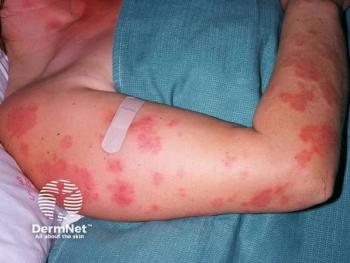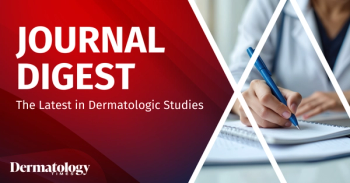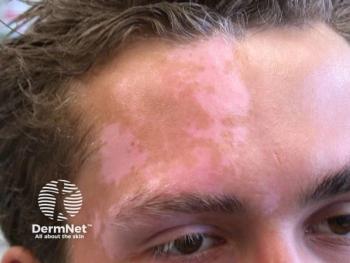
Late Breaking: Data From Pivotal Trial Reports Dupilumab Effective for Bullous Pemphigoid
Key Takeaways
- Dupilumab significantly improved sustained disease remission and reduced relapse rates in moderate-to-severe bullous pemphigoid compared to placebo.
- The study showed dupilumab's efficacy in reducing disease severity and itch, with significant improvements over placebo.
Late breaking data points to positive data for dupilumab for bullous pemphigoid.
Data from the ADEPT phase 2/3 study found dupilumab effective for adults with moderate-to-severe bullous pemphigoid (BP), meeting primary and secondary endpoints, according to late-breaking data presented at the 2025 American Academy of Dermatology Annual Meeting in Orlando, Florida.1
In the trial, participants (106 adults with moderate-to-severe BP) were randomized to receive dupilumab 300 mg (n=53) every 2 weeks after an initial loading dose or placebo (n=53), along with standard-of-care oral corticosteroids for a period of 52 weeks. Those patients who maintained disease control for 2 weeks could undergo corticosteroid tapering after 4 to 6 weeks. At that point, patients only received the active agent or placebo for a minimum of 20 weeks, unless they needed rescue treatment.
The researchers found 20% of patients who received dupilumab experienced sustained disease remission at 36 weeks while only 4% of those receiving placebo achieving sustained remission (p=0.0114). In addition, disease improvement was found during the trial. When compared to placebo, patients who received dupilumab were, with less relapse after the corticosteroid taper (59% vs 16%; nominal p=0.0023), less need for rescue therapy in treatment period (42% vs 12%; nominal p=0.0004), and more likely to achieve remission by week 16 (38% vs 27%; not significant).
Secondary endpoints were also met, according to the data presented, and the results were all statistically significant. Specifically, 41% of patients receiving dupilumab achieved at least a 90% reduction in disease severity while only 10% on placebo achieved such (p=0.0003). Clinically meaningful itch reduction was also achieved in 40% of the participants on the active drug and versus 11% of those on placebo. (p=0.0006). From baseline, more patients receiving dupilumab had a reduction in disease severity and itch when compared to placebo (77% vs 50%, p=0.0021 and 52% vs 27%, p=0.0021,respectively.) Similarly, patients on dupilumab experienced 40 days of complete remission without the use of corticosteroid while those on placebo only had 13 (p=0.0072).
Placebo and dupilumab had similar reports of adverse events (96% for dupilmuab and placebo). The most commonly reported adverse events for the active agent were eripheral edema, arthralgia, back pain, blurred vision, hypertension, asthma, conjunctivitis, constipation, upper respiratory tract infection, limb injury, and insomnia .
“There is a significant unmet medical need for new medicines for people suffering with this hard-to-treat disease in which the standard of care is oral and topical corticosteroids and immunosuppressants—treatments that have poor clinical outcomes and safety concerns, respectively, and should be used sparingly in an elderly population,” Dietmar Berger, MD, PhD, chief medical officer and global head of development at Sanofi, said in a press statement.2
“These positive pivotal results for bullous pemphigoid add to an immense body of scientific evidence that underscores the important role IL-4 and IL-13 play in driving diseases characterized by itch. Combined with the consistent safety profile of the other dermatology indications, these results show the potential of Dupixent to transform the treatment paradigm for bullous pemphigoid,” Berger said.2
“Dupixent is the first medication to show significant and robust impacts in this patient population,” added George D. Yancopoulos, MD, PhD, board co-chair, president and chief scientific officer at Regeneron, and a principal inventor of Dupixent.2 “These latest pivotal results reaffirm the underlying role type 2 inflammation plays in driving multiple skin diseases. We look forward to further advancing this research and sharing the positive results from the bullous pemphigoid pivotal trial with regulatory authorities.”
The supplemental biologics license application for treat BP was accepted for priority review in February, with a decision expected by June 20, 2025.
References
1. Efficacy and Safety of Dupilumab in Patients With Bullous Pemphigoid: Results From LIBERTY-BP ADEPT Phase 2/3 Study. Late Breaking Research Session 2. Presented at 2025 American Academy of Dermatology Annual Meeting; March 8, 2025; Orlando, Florida.
2. Dupixent® (dupilumab) Is the First and Only Biologic to Achieve Significant Improvements in Disease Remission and Symptoms in Bullous Pemphigoid (BP) Positive Pivotal Trial. Press release. September 11, 2024. Accessed March 8, 2025. https://investor.regeneron.com/news-releases/news-release-details/dupixentr-dupilumab-first-and-only-biologic-achieve-significant.
Newsletter
Like what you’re reading? Subscribe to Dermatology Times for weekly updates on therapies, innovations, and real-world practice tips.










